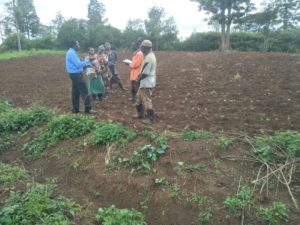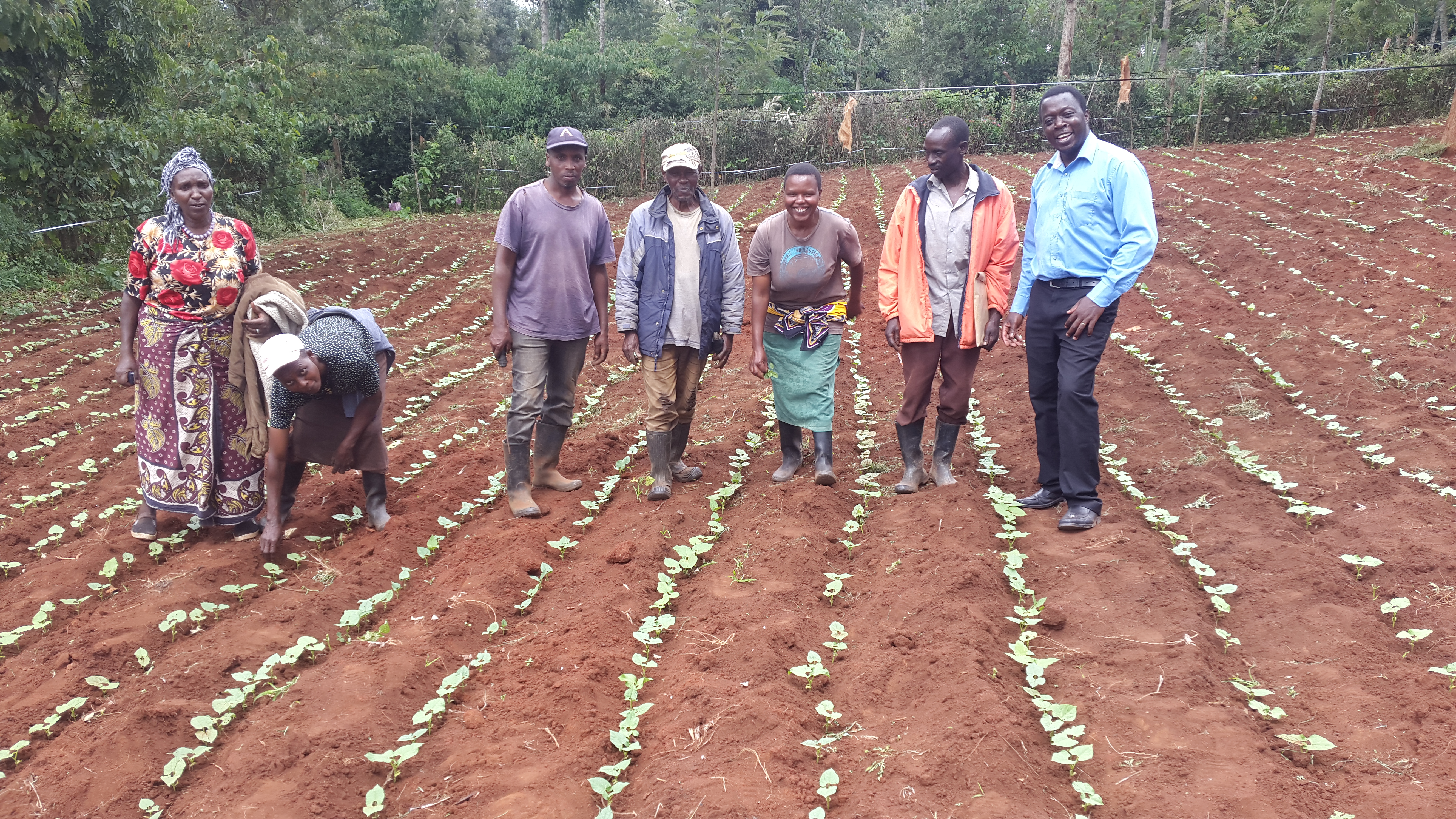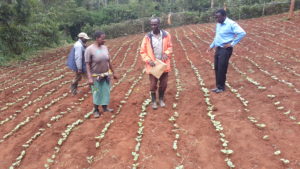One evening in October 2017 as a discussion over a cup of tea in a restaurant in Nairobi, Yosam Mugarura, and Mr. Nahashon Kariuki, the Chair of Board of Management (BOM) of the school had just met and were getting to know each other and their professions. Yosam is Head of Finance and Administration at CIAT Africa and Mr. Kariuki is Chair of the Board of Management (BOM) at Mwireri Secondary School. No one ever imagined that this was going to be the birth of a collaboration on bean production that would benefit a school and a village over 187km away in Mweiga, Nyeri County.
As the two shared on their work, Mr. Kariuki, out of curiosity, inquired how the wealth of knowledge in organizations such as CIAT can be harnessed to support schools and communities to improve agricultural production more so for the school feeding programs. This opened a much deeper discussion on the work of CIAT on beans, soil fertility, climate change and nutrition. Yosam elaborated the work of PABRA on beans and how we are rolling out the Bean Commodity Corridor Approach – intensifying production, linking farmers to markets and promoting bean consumption. Mr. Kariuki expressed deep interest, especially in bean production. He extended an invitation to CIAT to explore how a partnership could be mooted to start an initiative at the school and around the community.
Mweiga area in Nyeri falls in the drier side and experiences rainfall fluctuations. Growing of maize had become a big challenge due to failed crop caused by drought. Majority of farmers in this area grow Irish potatoes which, when combined with beans, offers a nutritious diet to the households. Growing early maturing crops such as beans could be the long awaited solution to the climate challenge but also contribute to the food and nutrition security.

Boaz Waswa of CIAT teaching members of the group the best bean production methods for maximum yields
Being the chair of the school board, Mr. Kariuki noted another entry point; the school feeding program. He observed that the school provides lunch to 200 students and the teachers. For some students, looking at their humble background, the school lunch is the only assured single meal of the day. Whereas the school has a farm, it buys the beans from far off markets. Mr. Kariuki wondered what would happen if the school farm could be used for production of the beans which would then be used for the students’ and teachers’ meals. Due to the failed flower industry in the area, most of the parents could not afford to pay school fees. These farmers, majority of whom are parents at the school, could be supported to produce beans, which would then be sold to school and used to offset school fee balances. These thoughts by Mr. Kariuki captured the elements envisaged in CIATs mission and our work: Reduce hunger and poverty, and improve human nutrition in the tropics through research aimed at increasing the eco-efficiency of agriculture.
With this knowledge, a discussion was held between Yosam and Boaz Waswa, a Senior Soil Fertility Specialist at CIAT PABRA on potential entry points for this collaboration. A decision was made to contact Mr. George Murage the head teacher, Mwireri Secondary School to explore how to operationalize the interventions. In the initial stages, CIAT-PABRA would facilitate establishment of a bean demonstration at the school to evaluate some selected bean varieties and good agricultural practices. This would set ground for out scaling the interventions to the rest of the community during the long rains in 2018. The team established a WhatsApp group- Nyeri Ben Platform- for instant interaction.
CIAT-PABRA experts, in collaboration with the school management, established a bean demonstration on the school farm in November 2017 where two bean varieties Mwitemania (GLP 92) and KATX56 from KALRO Katumani were grown. For each variety, a portion of seed was treated using ApronStar from Syngenta. ApronStar is a seed treatment fungicide/insecticide mixture for controlling systemic bean diseases as well as protecting seeds and seedlings against soil and early season insect pests. Appropriate agrochemicals were used to control bean pest and diseases. Due to the distance, a lot of the discussion, questions and photos were shared through the WhatsApp platform.
Interestingly, during this season, Mweiga area experienced a severe drought that resulted in drying of all crops in the farms. CIAT experts recommended strategic irrigation of the crop in the demonstrations using the little rainwater reserves at the school. This enabled the crop to grow to maturity. For each variety, half a kilogram of seed planted yielded 9kg for Mwitemania and 11kg for KATX56. This meant that every kilogram of seed planted resulted in 20kg grain yield, an impressive result considering that there was no rain throughout the growing season and the crop was produced under irrigation.
‘The impressive performance of the crop in the school demos has been an eye opener on the potential of bean production in the area. The school has set a side one and a half acres of the land to grow beans during this 2018 long rain season. From the produce, we will be able to meet a significant portion of our beans requirement for the school lunch program’ said Mr. Murage.
The performance of the beans in the midst of a severe drought that had decimated crops in the surrounding area drew a lot of interest from the neighbors and parents visiting the school. This led to them making inquiries about the varieties grown and requesting for technical support from CIAT. One such inquiry came from Ann Wanjiku, the Secretary of Mwireri Arahuka Business Self Help Group who called CIAT offices and requested support on how to grow and improve their bean production.
Mwireri Arahuka Business Self Help Group was formed on 21 March 2011 and comprises of 15 active members- 10 women and 5 men. The group implements various agricultural activities to support the members. These activities include poultry keeping, maize, beans and potato farming, rabbit keeping and some members are engaged in small business such as shop keeping. The group members support each other during production, collective purchase of agro inputs such as certified seed, fertilizers and pesticides as well as during collective marketing of their produce. The group members build on each other’s strength. For example, the Chairman, Mr. Edward Waweru is a certified agro pesticide handling specialist and a trainer of trainers. Anne Wanjiku is an excellent businessperson, partnership builder and communicator of the group.
CIAT teams led by Boaz set in motion a plan for an agricultural intervention with this group during the 2018 long rains period. In March 2018, CIAT facilitated the farmer groups to access three bean varieties: KATX56 (a red kidney type), KATX69 (a red mottled type) and KAT- B1 (yellow bean). The varieties are adapted to the climatic conditions around Mweiga, Nyeri. A common demonstration has been established comprising of these three bean varieties. Further, every member of the group has received 1-2 kg of bean seed of the different varieties to try on their own farms.
‘We are happy that we can produce enough beans to feed our families and spare some to sell. We are also happy that the headmaster of Mwireri Secondary School has promised to buy from us any excess beans to use for their school lunch or to clear any fee balances of our members’, Said Ann Wanjiku.
Together, local schools, the farmer group and CIAT experts are walking together through the season to achieve the shared goal of increasing bean production for improve household food and nutrition security and incomes. What started as a discussion over a cup of tea is growing and revolutionizing bean production in Nyeri and creating an opportunity to impart agriculture skills to thousands of students across the country.


